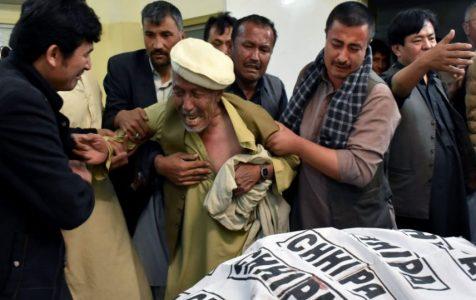
ISIS terrorists are targeting religious minorities and security forces in Balochistan
The Islamic State terror group has set up camp in Pakistan’s Balochistan province and is targeting religious minorities and paramilitary troops in the troubled region.
A highly reliable security source told Asia Times that the dreaded terror network, which was entrenched in Afghanistan’s Nangarhar and Khorasan provinces, had sneaked into Balochistan, where dozens of homegrown militant organizations are already.
The ISIS, he said, had put down roots in Balochistan with support from indigenous terror groups including Lashkar-e-Jhangvi and splinter groups of Tehrik-e-Taliban Pakistan (TTP).
Some 260 civilians and security personnel were killed in Balochistan last year along with 83 alleged terrorists, according to the South Asia Terrorism Portal (SATP). A majority of these attacks were carried out by ISIS.
The terror group has continued targeting Christians and Shiite Muslims this year too. On Sunday, two Shiite Muslims from the Hazara community and a police officer were killed in an attack near Western Bypass in Balochistan’s capital Quetta.
Last week, IS operatives gunned down two Christians while they were headed to church in Quetta. Eight others sustained bullet injuries in the drive-by attack, some of whom are still critical and undergoing treatment in intensive care. Early this month, IS operatives sprayed bullets on another man from the Hazara community, killing him on the spot, and injuring one other.
During Easter four members of a Christian family were shot dead in Balochistan. The family had come to spend the festival with their relatives in the volatile region and ISIS claimed responsibility for the attack.
In December, two ISIS suicide bombers blew themselves up at a packed Quetta church, killing nine and wounding over a dozen people.
While attacks on Christian minorities have intensified, Pakistani military sources have persistently denied the presence of ISIS in the country. Then, in June last year, Inter-Service Public Relations (ISPR) — the media wing of Pakistan army — declared that Special Services Group (SSG) commandos had killed at least 12 IS operatives in an “intelligence-based counter-insurgency operation” on the outskirts of Balochistan’s Mastung district.
The three-day operation, targeting a range of caves situated 50 kilometers from Quetta, was part of counter-terrorism Operation Radd-ul-Fasaad, launched in February 2017. ISPR claimed the caves were the “command and control center” of ISIS in Pakistan and that military gunship helicopters had taken out the terror group’s organizational structure.
Despite this, IS has claimed responsibility for a spate of recent attacks. In fact, within hours of the ISPR press release in June, a Chinese couple that was abducted three weeks before by ISIS operatives in police uniforms, was killed in Quetta. The couple was identified by Pakistani and Chinese intelligence agencies as missionaries who were in Balochistan to preach Christianity under the guise of a Mandarin learning center.
Foreigners in Pakistan usually need permission from the authorities for even a short visit to Balochistan, but a good number of Chinese have settled in the province, mainly to work on CPEC projects.
“The military command is particularly cautious about China-Pakistan Economic Corridor (CPEC) and is expending over US$1.3 billion annually on putting in place a failsafe security mechanism that could provide much-needed protection to CPEC-related projects and the Chinese personnel working on these projects,” the security source said. He said a 15,000-strong force from the Pakistan army provides round-the-clock surveillance to protect infrastructure facilities and human resources.
In August last year, the military set up two Special Security Divisions for this purpose. One division is responsible for reconnaissance from Rawalpindi to Gwadar, the port in the south, with the second is responsible for reconnaissance from Khunjerab, a pass high in the Karakorams, to Rawalpindi in the north.
Initially, the Pakistani side pushed for reimbursement of security-related cost, but the Chinese did not budge on sharing any cost on security for the multi-billion-dollar-project, saying it was none of their business.
Source: Asia Times





